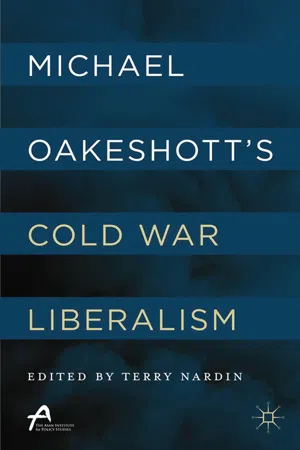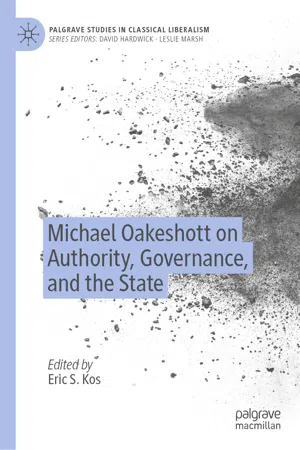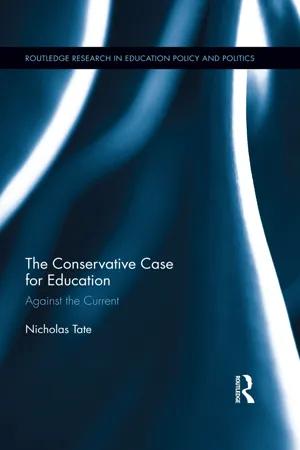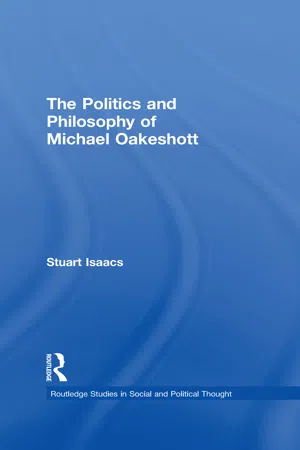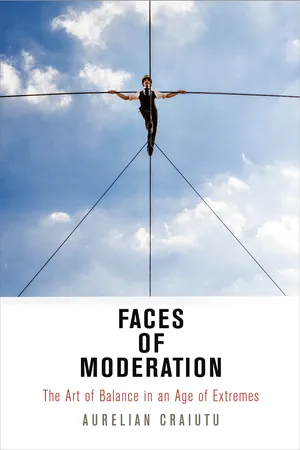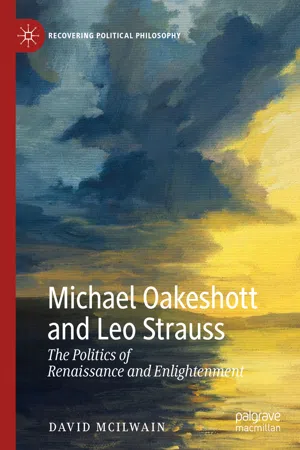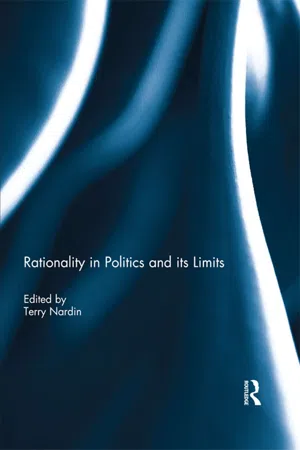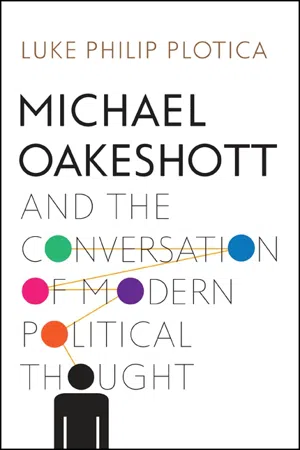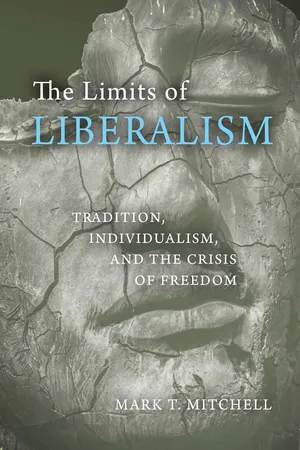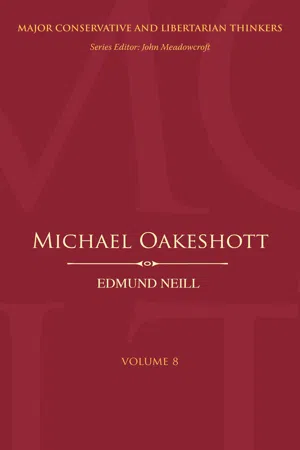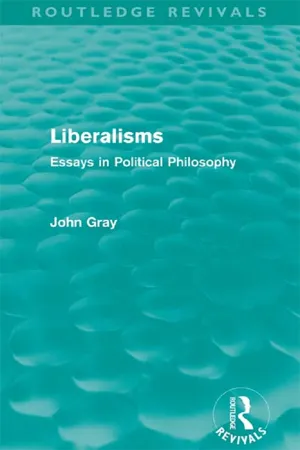Politics & International Relations
Michael Oakeshott
Michael Oakeshott was a prominent political philosopher known for his contributions to conservative thought. He emphasized the importance of tradition, gradual change, and the limitations of rationalism in politics. Oakeshott's work focused on the idea of "the rule of law" and the role of government in preserving individual freedom and maintaining order.
Written by Perlego with AI-assistance
11 Key excerpts on "Michael Oakeshott"
- eBook - ePub
- T. Nardin, T. Nardin(Authors)
- 2015(Publication Date)
- Palgrave Macmillan(Publisher)
Do these remarks on the character and significance of Oakeshott’s thought suggest an answer to the question I dismissed at the beginning of this paper, whether that thought is liberal or conservative? That Oakeshott is a genuine philosopher, not an ideologue, suggests that the dismissal is warranted. The philosophy of politics he arrived at after many years of reflection rests on a distinction between civil and enterprise association that cuts across the liberal-conservative distinction and assigns both liberalism and conservatism to the enterprise category. And this suggests, given a preference for civil association that is evident in moments when he slips from theorizing to moralizing, that Oakeshott’s thought is neither liberal nor conservative. He treats freedom as a postulate of civil association, defining just laws to be those that respect independence and forbid domination, which suggests a close but largely unexplored relationship between his theory of civil association and Kant’s theory of right. And his critique of Rationalism, together with his observation that a state that wishes to preserve its civil character cannot forego the enterprise of maintaining itself by policies that must at times violate civil laws, suggests an affinity with themes that are characteristic of political realism.Notes1. Michael Oakeshott, On Human Conduct (Oxford: Oxford University Press, 1975), 27–31.2. This is not to dispute the point that some of Oakeshott’s writing on politics is ideological, but it is to challenge making ideology central to his political thought. Andrew Gamble, “Oakeshott’s Ideological Politics: Conservative or Liberal?” in The Cambridge Companion to Oakeshott - Eric S. Kos, Eric S. Kos(Authors)
- 2019(Publication Date)
- Palgrave Macmillan(Publisher)
© The Author(s) 2019Begin AbstractEric S. Kos (ed.)Michael Oakeshott on Authority, Governance, and the State Palgrave Studies in Classical Liberalism https://doi.org/10.1007/978-3-030-17455-2_44. Oakeshott on the State: Between History and Philosophy
End Abstract1 I2 II—Oakeshott: Historian of Political Thought3 III—History and Other Disciplines4 IV—Conclusion1 I
Oakeshott was a philosopher as well as an historian. He engaged in philosophy by reflecting upon the character of experience and was an historian of political thought in examining the historical conditions in which distinct forms of political thinking arise. For Oakeshott, these two activities are separate. Philosophy understands experience in an unconditional and general way. It understands the postulates of activities, such as art, history, and practical life. It conceptualizes the experiential orientation of thinking historically, practicing science, contemplating artistic images, and negotiating the twists and turns of practical life. Insofar as it is philosophical, thought does not engage with practical tasks, recognize how the past has changed into the present, contemplate scenes artistically, or generate hypothetical scientific laws. Rather it conceptualizes what we are up to in undertaking practical action or in tracing antecedent events, which relate to a political action such as the referendum decision of the UK to leave the European Union. An historian’s understanding an event such as Brexit, the prospective withdrawal of the UK from the European Union, relates the referendum decision to leave the EU to past events that preceded it and rendered it possible. So a series of events and developing attitudes within the Conservative Party might be invoked to explain why Cameron considered it useful to stage a referendum on this issue of EU membership. At the same time, historical events and developing attitudes in the UK to issues relating to UK membership of the EU might be referenced to explain the vote for Brexit. The historian by his study of events preceding the referendum decision to withdraw from the EU would not be committed to either supporting or denouncing Brexit. The moral and instrumental preferences of practical life are irrelevant to historical understanding. Likewise, the historian does not have to frame a philosophical understanding of the postulates of history to justify her narrative. The past may be real or imagined, and the status of beliefs and practices unquestioned, but the historian can still provide a convincing account of an historical topic. Hence for Oakeshott, philosophy, history, and practice are separate from one another and according to some of the idioms that he uses to describe their relations, they are insulated from one another. Yet, in fact, are philosophy and history distinct from one another? Are philosophical and historical forms of inquiry to be considered altogether distinct from one another? In this essay, I will argue that they are intertwined in Oakeshott’s own account of the state, notwithstanding his own reading of their distinctness.1Of course, to criticize Oakeshott on this score is susceptible to the caveat entertained by Minogue in his essay, “The Fate of Rationalism in Oakeshott’s Thought,” “As ever with Oakeshott, the detail of the argument is marvelously suggestive, and its development so subtle that it can be criticized only by the most brutish grasp of what he might be up to.”2- eBook - ePub
The Conservative Case for Education
Against the Current
- Nicholas Tate(Author)
- 2017(Publication Date)
- Routledge(Publisher)
Michael OakeshottPassage contains an image
11Michael Oakeshott – philosopher and educatorMichael Oakeshott (1901–90), unlike T S Eliot, cannot be said, either now or at any point during his long life, to have been a ‘household name’. As a philosopher and political thinker he would probably have been better known had he been writing and teaching in France, where philosophy is taught in schools and intellectuals are still sometimes ‘household names’. Even there, as a critic of ‘ideologies’, ‘theories’ and what he called ‘rationalism’, one cannot imagine him settling comfortably into the role of a ‘public intellectual’.Interest in his thinking, however, has continued to grow, and in particular as it concerns the nature of the political life, different types of state and society and different forms of knowledge, and as it throws light on concepts such as ‘liberalism’, ‘conservatism’ and ‘modernity’. One commentator even describes Oakeshott’s later philosophy as ‘quite possibly the greatest philosophic system of the twentieth century’ (although one cannot help feeling that the word ‘system’ is not one that would have appealed to him) (Alexander 2012: 37).Although Oakeshott spent most of his life writing and teaching about politics and political history his interests were never narrowly political and embraced all aspects of ‘our life as human beings in society’ – beliefs, habits, morals and dispositions – and all the varied ways in which, as human beings, we try to make sense of the world (through science, philosophy, history, poetry and practical activity). His two major works – Experience and its Modes (1933) and On Human Conduct (1975) – range widely across many aspects of human understanding, in the case of the former, and human action, in the case of the latter (Oakeshott 1933; Oakeshott 1975; Podoksik 2003: 130). He had a particular interest in history as a distinctive type of enquiry, having studied history at Cambridge and spent the first part of his career as a history don at his old college. A collection of essays on the topic was published as On History and Other Essays - eBook - ePub
- Stuart Isaacs(Author)
- 2006(Publication Date)
- Routledge(Publisher)
In general, Gray is only able to state that Oakeshott is a liberal by ignoring other ways that his thought may be characterised – for example, as a conservative. But the real point is that such labels are limiting. Gray makes the mistake of being too anxious to situate Oakeshott ‘ideologically’ and in so doing makes an error about his understanding of politics. Gray takes Oakeshott’s understanding of politics to be conceptualised as a ‘conversation’. From this point he argues that its unique voice should be maintained. He states that politics is recognised by Oakeshott as moderate and accommodating, in which what is sought is peace, not truth. This may well be a liberal image of politics but it is not Oakeshott’s. As we have seen, Oakeshott’s ‘conversation’ is the concept of experience (as a non-foundational ‘concrete universal’) that appears in EM and reappears in OHC as ‘all that is going-on’. There are an infinite number of ‘voices’ (or modes) in the conversation. While Oakeshott describes what appears to be the most coherent of these (philosophy, history, science, ‘poetry’, practice), politics does not have its own separate voice, as such. In theoretical terms politics may be understood under the terms of history and philosophy, in practical terms under the postulates of human and moral conduct. Furthermore, while political activity is understood as the pursuit of intimations this is taken as an explanation of human action. It is what actually happens, what is achieved in practice. But its features are those of argument and contestation, of dogmas and rules. In OHC Oakeshott points out that ‘politics’ has a private self-interested dimension, as well as being part of the public concern. In putting forward this description he is at pains to disassociate ‘politics’ from any but a particular philosophical understanding. It is understood as a postulate of civitas, a condition of civil association, not a ‘peaceful’ image of political activity. It is true that Oakeshott gives politics a distinctive character, that it has a particular place in his theory of human conduct, but this is an account that is wedded to his philosophy as a whole, and this is not a marriage of convenience for liberalism.Gray’s general mistake is to abstract from Oakeshott’s philosophy certain conclusions he reaches about politics. For this reason he mistakenly associates lex with a classical liberal view of civil association and with a particular form of government. He also inappropriately criticises it on this basis. But as I have argued in Chapter 8 - eBook - ePub
Faces of Moderation
The Art of Balance in an Age of Extremes
- Aurelian Craiutu(Author)
- 2016(Publication Date)
- University of Pennsylvania Press(Publisher)
ad usum populi . The second main reason refers to the fact that the proponents of ideological politics maintain that politics should always be conducted from the unique standpoint of a comprehensive set of beliefs and must be allowed to pervade all spheres of life, having monopoly over the setting of the “right” moral and political priorities. Oakeshott took issue with this view, which he found both inadequate and dangerous. In politics, he maintained in one of his best essays (“Political Education”), every enterprise is “a consequential enterprise, the pursuit not of a dream, or of a general principle, but of an intimation. What we have to do with is something less imposing than logical implications or necessary consequences” (1991: 57). Political judgment cannot be based on mistake-proof arguments or apodictic assumptions; it ought to pursue intimations of traditions of behavior and can at best offer a modest contribution to an ongoing conversation, which must always remain open. Because there are certain features of political activity that can never be eliminated or entirely corrected, our judgments should therefore be circumstantial, revolving around contingencies and traditions of behavior: “[W]e have no resources outside the fragments, the vestiges, the relics of [our] own tradition of behavior” (Oakeshott, 1991: 59). As such, political judgment is “not designed to reach universal conclusions, but to recommend or justify a proposal about what to do now” (2008: 186). Political argument seeks to both justify a set of policies or values and induce agreement.It is no secret that Oakeshott viewed ideologies as expressions of the very rationalism he criticized in “Rationalism in Politics.” The proponents of ideological politics think they possess an infallible measuring rod and tend to evaluate all proposals for social and political change “against a single, unambiguous, universally valid measure” (1991: 83) that is given the status of an undisputed axiom. In so doing, they seek, in fact, to emancipate politics from opinion and conjecture by conducting themselves according to “iron laws” of history and social change. Because they approach ideas and principles sub specie aeternitatis , they have difficulties handling the ever changing contingencies of political life. Needless to say, Oakeshott was not the first one to oppose ideological politics; in this regard, he was a man of his own time who shared a lot in common with other thinkers, equally concerned with the rise of political intransigence and dogmatism in the age of mass society and the Cold War. Like Raymond Aron and Isaiah Berlin, Oakeshott sought to inoculate his fellow citizens against the seduction of utopianism and extremism. He was a political moderate who did not believe that the proper answer to the pathologies of faith was an even stronger belief in the “right” values. Therefore, the solution he proposed was not a new, stronger, or better faith, but a nuanced politics of skepticism tempered by an original conservative temperament.21 - eBook - ePub
Michael Oakeshott and Leo Strauss
The Politics of Renaissance and Enlightenment
- David McIlwain(Author)
- 2019(Publication Date)
- Palgrave Macmillan(Publisher)
2Michael Oakeshott, Rationalism in Politics and Other Essays , ed. Timothy Fuller (Indianapolis: Liberty Press, 1991), xi; Michael Oakeshott, Experience and Its Modes (Cambridge: Cambridge University Press, 1933), 296.3Michael Oakeshott, On Human Conduct (Oxford: Oxford University Press, 1975), 84.4Alexandre Kojève, “The Idea of Death in the Philosophy of Hegel,” trans. Joseph J. Carpino Interpretation 3, no. 2/3 (1973): 124.5Oakeshott, Experience and Its Modes , 10.6 Ibid., 196.7Michael Oakeshott, “Review of N. Berdyaev, The Meaning of History (1936),” in The Concept of a Philosophical Jurisprudence: Essays and Reviews 1926–51, Selected Writings, Volume III , ed. Luke O’Sullivan (Exeter: Imprint Academic, 2007), 137.8Stanley Rosen, G. W. F. Hegel: An Introduction to the Science of Wisdom (South Bend: St. Augustine’s Press, 2000), 221–222.9Michael Oakeshott, “Introduction to Leviathan ,” in Hobbes on Civil Association (Indianapolis: Liberty Fund, 2000), 61–62.10Wendell John Coats Jr., Oakeshott and His Contemporaries: Montaigne, St. Augustine, Hegel, Et al (Selinsgrove: Susquehanna University Press, 2000), 42.11Michael Oakeshott, “The Importance of the Historical Element in Christianity,” in Religion, Politics and the Moral Life , ed. Timothy Fuller (New Haven: Yale University Press, 1993), 69.12Michael Oakeshott, “Dr. Leo Strauss on Hobbes,” in Hobbes on Civil Association , 157.13Paul Franco, introduction to Oakeshott, Hobbes on Civil Association , ix.14Leo Strauss, The Political Philosophy of Hobbes: Its Basis and Its Genesis - eBook - ePub
- Terry Nardin(Author)
- 2017(Publication Date)
- Routledge(Publisher)
RESEARCH ARTICLE
Oakeshott on theory and practice
Terry Nardin Department of Political Science, Faculty of Arts and Social Sciences, National University of Singapore, SingaporeThe expression ‘theory and practice’ implies a separation between the two, even when that separation is denied. Political theorists are divided on the question of their relationship, some regretting the abstraction of theory and its consequent irrelevance to practical discourse and action, others insisting that no theory is without practical biases or implications. Oakeshott’s contribution has been to suggest that theory and practice – or, more exactly, the activities those words identify, theorizing, and doing – are conceptually distinct. Much can be learned about the vocation of political theorist, in contrast to that of the citizen or politician, by distinguishing theory and theorizing from practice and doing. Whether political theorizing emerges as an autonomous activity only when it is distinguished from political activity and whether this autonomy should be cultivated or rejected are questions that invite continued debate.Politics is a practical activity. The study of politics – political inquiry, which may take the form of political science, political history, or political philosophy – can also be practical in the sense of aiming to make a difference in the world of political affairs. But must that study be practical? Let us grant that the arguments of political scientists, historians, and philosophers are often practical either by intention or by contamination. The question I want to consider is whether, setting aside such contingencies, the study of politics can be purely theoretical – that is, theoretical in aiming to understand and explain the objects it studies without also being practical in the sense wanting to alter or preserve them. Michael Oakeshott is one of the few political theorists who defends the separation of political theory from its subject, politics. The activity of theorizing politics can be detached from the intentions or motives of political agents – those who are engaged in making political decisions and arguments (and political theorists, when they trade reflection for advocacy and action are political agents). It is, moreover, distinctively theoretical to the degree that it achieves such detachment. In particular, to theorize politics is to try to understand political decisions and arguments in terms of their presuppositions (Oakeshott 1975, 1–31). On this view, a space for theorizing that is distinct from doing is opened up because it is possible to say something about a political decision or argument that is not already - Luke Philip Plotica(Author)
- 2015(Publication Date)
- SUNY Press(Publisher)
The emphasis upon tradition may appear to stand in tension with Oakeshott’s valorization of individual agency, yet I argue that his treatment of tradition is most fruitfully understood as intertwined with his analysis of contingency as a fundamental, inexorable condition of thought and action. Considering the interaction between these two concepts in Oakeshott’s thought brings him into conversation with theorists of tradition and community, such as Alasdair MacIntyre, Edward Shils, and Charles Taylor, each of whom seeks to illustrate how individual agents are deeply embedded in networks of tradition. Read alongside these thinkers, Oakeshott provides a view of individuality and tradition that recognizes the profound effects of intersubjective practices and sentiments without affording tradition an independent normative status. Building from the broad philosophical themes of chapters 1 and 2, in chapter 3 I take up an expressly political concern and consider Oakeshott’s characterization of the “modern European state.” In order to elaborate Oakeshott’s account of the emergence, conditions, and character of the state, I explore elements of his political thought that resonate with the work of three significant twentieth-century political thinkers who grappled with the concept of the modern state and its attendant philosophical and practical problems: Michel Foucault, Isaiah Berlin, and Hannah Arendt. I begin by examining the affinities between Oakeshott’s account of the emergence and character of the modern state and Foucault’s analyses of the logic and pragmatics of state power (via his accounts of “governmentality” and “bio-power”). I next consider points of convergence and divergence between Oakeshott and Berlin regarding the condition of plurality in modern political communities and its implications for political freedom- eBook - ePub
The Limits of Liberalism
Tradition, Individualism, and the Crisis of Freedom
- Mark T. Mitchell(Author)
- 2018(Publication Date)
- University of Notre Dame Press(Publisher)
First, Oakeshott emphasizes that he is not describing what motivates progressive politicians and revolutionaries or what they believe they are doing, but rather he is describing what they actually succeed in doing. Second, some have suggested that Oakeshott’s approach to politics replaces political reasoning with “acting on hunches” or “following intuitions.” Oakeshott denies this and argues that if politics is how he describes it, then certain approaches to politics “must be considered either irrelevant or as clumsy formulations of other and relevant inquiries.” 111 Third, some have suggested that Oakeshott’s approach includes no theory of the good by which to judge the relative merits of one project over another, but this “is an unfortunate misreading of what I said: ‘everything figures, not with what stands next to it, but with the whole.’” 112 Oakeshott asks his opponents to consider a concrete case in which a barrister in a court of appeal argues that his client has been awarded an inadequate sum. Does he simply claim that the award represents a gross injustice? Or does he attempt to show that the award is out of keeping with what is generally awarded in similar cases? Since the latter is obviously true and even assumed in the former, it follows that appeals to abstract notions of justice or equality are incapable of producing the desired effects. Thus, Oakeshott repeats, “moral and political ‘principles’ are abridgments of traditional manners of behaviour, and to refer specific conduct to ‘principles’ is not what it is made to appear.” 113 Fourth, some point out that most complex societies actually consist of a plurality of traditions. If this is the case, then Oakeshott’s position appears to fragment wildly and actually serve to fracture a society rather than add to its overall coherence. To this Oakeshott offers three terse replies - eBook - ePub
- Edmund Neill(Author)
- 2013(Publication Date)
- Bloomsbury Academic(Publisher)
Experience and Its Modes, Oakeshott argues that this leaves no room for the philosophy of law to be a normative exercise – since the latter pursuit is by definition a practical and not a philosophical inquiry.By contrast, in other works written in the 1930s, particularly later in the decade, Oakeshott departs from the position put forward in Experience and Its Modes, to some extent focusing more on practical political questions, rather than determining the limits of ethics and political philosophy, and even raising the possibility of there being a closer, more reciprocal relationship between theory and practice than envisaged in his earlier work. Thus despite remaining aloof from practical politics for much of the 1930s, notoriously instead focusing some of his energies on writing a teasingly entitled book on horse-racing (Oakeshott and Griffith 1936), as we saw in chapter one, even Oakeshott felt impelled by the events of Munich in 1938 (encouraged by the intervention of his friend Ernest Barker) to compile an anthology considering the nature of the most important ‘social and political doctrines of contemporary Europe‘, these being representative democracy, Catholicism, communism, Fascism and National Socialism. Even here, Oakeshott is anxious to downplay the idea that the value of any particular kind of political practice can be measured by the extent to which it can be theoretically articulated, but he does at least concede that ‘when a [political] regime chooses to rationalize its practice . . . the coherence of such a statement becomes a matter or importance; and if it can be convicted of intellectual confusion, that is not a fault that can be brushed aside as insignificant’ (Oakeshott 1939: xv - emphasis mine). In particular, despite the studied neutrality with which he puts forward his analysis, Oakeshott maintains that communism, Fascism and National Socialism all suffer by comparison with the other two, in ways that subsequently become significant in his later work, namely that they lack a proper appreciation of the importance of tradition, and accede to the handing over to a group of self-appointed leaders the planning of the entire life of a society. (By contrast, ‘to the Liberal and Catholic mind alike the notion that men can authoritatively plan and impose a way of life upon a society appears to be a piece of pretentious ignorance’ [Oakeshott1939: xxiin.1].) Andmore theoretically, in the essay ‘The Claims of Politics‘, written soon after in 1939, although Oakeshott writes contemptuously of the nature of politics itself, arguing that it ‘is neither the only adequate expression, nor the overwhelmingly most important expression of a sensibility for the communal interests of a society’ (Oakeshott 1993b: 94), and that it is an activity which necessarily requires ‘a mind fixed and callous to all subtle distinctions’ (Oakeshott 1993b: 93), he nevertheless also here stresses the importance of some kind of theoretical articulation in safeguarding the health of society, again in defiance of the absolute separation of theory and practice insisted upon in Experience and Its Modes. Rather than this theoretical articulation being a political one, however, Oakeshott argues that it will be the work of the artist - or possibly the philosopher – so that through their work, ‘a society [potentially] becomes conscious and critical of itself’ (Oakeshott 1993b: 95), hence protecting it from a ‘corruption of its consciousness’ (Oakeshott 1993b: 95) through the illumination and analysis of its crucial values and premises. And if in maintaining this claim Oakeshott was partly picking up themes he had explored much earlier in his career, before the austere separation of theory and practice propagated in Experience and Its Modes – most notably in an ‘Essay on the Relations of Philosophy, Poetry and Reality’ – more immediately he may well have been responding to a similar argument made by Collingwood in his recently published Principles of Art, a work Oakeshott had recently favourably reviewed (Oakeshott 1937/8: 487). Indeed, the very phrase ‘the corruption of consciousness’ is Collingwood’s.22 - eBook - ePub
Liberalisms (Routledge Revivals)
Essays in Political Philosophy
- John Gray(Author)
- 2013(Publication Date)
- Routledge(Publisher)
Chapter eleven
Oakeshott on law, liberty and civil association
Always subtle in its substance and often oblique and almost hermetic in its expression, the thought of Michael Oakeshott constitutes one of the most profound and radical passages in the history of recent reflection on the character of law, liberty and government. Oakeshott has himself been careful to disavow anything akin to a settled doctrine, but he does not deny that his writings disclose ‘a consistent style or disposition of thought’1 about the relations of law with liberty and their bearings on the engagements of government. If there is not a doctrine on these matters to be found in his writings, there is nevertheless a definite conception, maintained and developed throughout his works, of the form of political order that best protects both law and liberty, a conception whose separate elements are unified in Oakeshott's conception of civil association. This is a notion elaborated upon in Oakeshott's later writings, intimated perhaps in his earliest publications, which finds different idioms of expression as different styles of theorizing are absorbed (sometimes without leaving a trace) into the body of his thought. One of my aims in this exploration of Oakeshott's thought is to elucidate this conception of civil association, to link it up with the rest of Oakeshott's thought, and to see what might be said in criticism of it. My chief purpose, however, is to argue that in his conception of civil association Oakeshott has isolated and identified the very kernel of ‘liberalism’, which is a mode of associations constituted by adherence to rules that are as non-instrumental — that is to say, as little substantive and as much procedural — as is attainable. It is this conception, in which the historic inheritance of civil society is illuminated by being theorized and given a partial relief from contingency, that captures what is most instructive (and most valuable) in ‘liberalism’. Oakeshott's account is mediated through the reflections of the greatest earlier theorists of civil society — Hobbes and Hegel — but it sketches the lineaments of its subject with the least distortion from the metaphysical context in which earlier accounts were framed. Further, it separates the most essential elements of the idea of civil association from irrelevant accretions which have become attached to it — such as doctrines of human rights, the minimum State, laissez-faire
Index pages curate the most relevant extracts from our library of academic textbooks. They’ve been created using an in-house natural language model (NLM), each adding context and meaning to key research topics.
Explore more topic indexes
Explore more topic indexes
1 of 6
Explore more topic indexes
1 of 4
